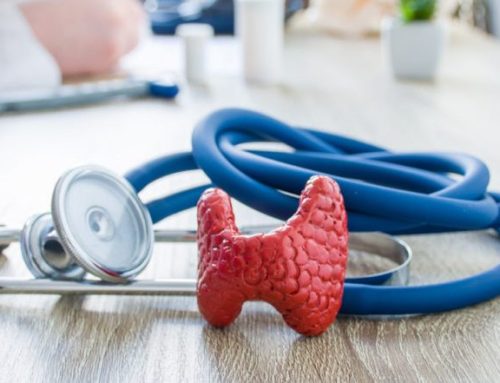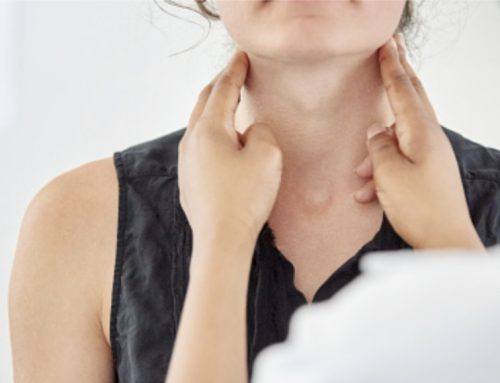I hear this question often as I am a Registered Dietitian who specializes in helping women sustainably treat and reverse their Hashimoto’s and Hypothyroidism through diet and lifestyle changes.
For many of my clients, being diagnosed with Hashimoto’s or Hypothyroidism is (at first) a relief. So many women struggle with symptoms and “feel off” with no explanation. Whether it was gaining weight and the inability to lose it or feeling so tired you can’t get out of bed. My clients loved hearing that it wasn’t just their imagination or something they were doing wrong.
Although there’s initial relief, a lot of times anxiety, confusion, stress, etc can set in. The mind begins to wander… “Am I going to be okay?,” “Is this dangerous?,” “Can I reverse it?,” “Do I need to take medication forever?,” “What do I do next for my diet and lifestyle?”’
A new diagnosis can be overwhelming and frustrating, especially when you start diving into google searches. One professional says this, another says that, but this worked for her… can you relate?
Have you ever caught yourself following common weight loss advice…. Count your calories? Try regular keto? Work out harder and eat less?
Yeah… we’ve all been there.
With hypothyroidism and Hashimoto’s WHAT you eat > how much you eat. Standard weight loss protocols are not going to work the same in those with hormone imbalances.
With the right approach you can manage and live well with Hashimoto’s and Hypothyroidism.
Let me give you a rundown on the first steps you’ll want to take when diagnosed with Hashimoto’s or hypothyroidism.
Step 1: Understand the Terminology
The thyroid is a small, butterfly-shaped gland located in the front of your neck. Its main job is to release T3 and T4 hormones into your bloodstream to control your metabolism. These hormones tell the cells in your body how much energy to use while also controlling your heart rate and body temperature.
When your thyroid works as it should, it constantly makes and releases hormones to keep your metabolism in check and your systems functioning correctly. However, when your thyroid is underactive, it can affect your entire body, creating hormone imbalances, like hypothyroidism and Hashimoto’s.
Hypothyroidism refers to an underactive thyroid, when your thyroid does not produce enough of certain hormones. It can lead to a host of symptoms like weight gain, fatigue, depression and others. Most of the time, you get a diagnosis because you’ve been having symptoms and your medical provider runs tests to confirm why you’re feeling the way you do.
Hypothyroidism comes in two forms: non-autoimmune thyroid disease, and the autoimmune form called Hashimoto’s thyroiditis (the most common form). It is differentiated by the presence of thyroid attacking antibodies in your blood (identified by labs).
Step 2: Know your Type of Thyroid Imbalance
There are 3 different types of thyroid imbalances. It is common to have little bits and parts of all of them but typically there is one that is dominant.
- Insulin resistance
Insulin resistance can be caused by high carb or moderate carb diets. After years of eating high carbs foods, when your body makes insulin your cells begin to resist it. This leads to sugar being stored as FAT (instead of using it as energy) and this ultimately leads to weight gain, fatigue and feeling hungry all the time.
This is also when you’ll begin to notice low calorie diets aren’t working anymore. For this reason, The Keto Girl Method does not focus on calories and eating less and instead, WHAT you’re eating and finding your carb tolerance.
- Inflammation
Inflammation can show up as food intolerances and/or gut issues. All of sudden you may not be able to tolerate gluten or dairy, etc. Are you bloated, puffy in the face, have swollen hands and feet, or seeing an increase in acne? This can all be due to inflammation.
There are two ways this happens. Insulin resistance leads to excess fat storage and weight gain OR you can be resistance to leptin (tells us when we’re full), so you’re always hungry, leading to weight gain.
- High cortisol (adrenal fatigue)
Do you feel wired at night but can’t seem to get up in the morning? Normally, you should have a jump start of cortisol in the morning and a decrease at night. With thyroid conditions, people typically see the opposite. This is due to constant life stress and inflammation.
This is the longest to reverse and I recommend to be gentle and kind to your body by swapping out those high intensity workouts to lower intensity ones like walking, yoga or Pilates.
Figure out which one sounds most like you?
Good news is… they can ALL be reversed.
Step 2: Go gluten, dairy and egg free while limiting sugar
This is the first dietary change all of my Keto Girls make. These four foods are inflammatory and should be reduced and/or eliminated.
Here’s why:
Gluten impairs absorption of fat soluble vitamins (DAKE) and fatty acids (essential for reproductive and adrenal hormones). It also causes leaky gut which increases cortisol (stress hormones).
Dairy contains IGF-1 (insulin growth factor) which spikes insulin and increases testosterone and estrogen which can lead to weight gain.
Eggs have shown to be inflammatory for autoimmune disorders. Hypothyroid clients have seen the benefit of being egg-free.
Now before you worry about what you’ll eat and never being able to enjoy your favorite meal again… as you start to reverse your condition and your body starts to heal, you’ll be able to re-introduce some of these foods while maintaining results!
Step 3: Develop a growth mindset
Your mindset is everything! Be kind, gentle and forgiving. Eat some dairy or gluten? Fall off the meal prep for a week? It’s okay and it’s important to move on!!
I encourage my Keto Girls to honor their goals. Keep them written down and keep in mind what your life would look like if you were able to reverse your hormone imbalance. Having both long-term and short-term goals and finding non-food rewards to motivate you is a great way to keep a positive mindset!
Keto Girl Success
“Your labs indicate subclinical hypothyroidism. Let’s start you on Levothyroxine.
These were the words Keto Girl Tara heard from her doctor one month prior to starting the Keto Girl program.
Tara was tired of gaining weight. She had tried calorie counting and a vegan diet with no success. She even tried regular keto and although she lost 10 pounds over 7 months, it was not sustainable for her and her sanity; she still felt exhausted and blah.
“An anti-inflammatory keto approach that is dairy-free and gluten-free with no carb tracking?! How am I even supposed to make that work?!”
This was Tara’s initial response, but she knew she had to try it because of the success she had heard from others.
Tara trusted the Keto Girl process. She started avoiding high inflammatory foods, and rather than tracking her carbs, she listened to her body. She began taking note of when she was hungry and full, and what inflammation felt like.
Within a week she had lost weight, had more energy and was sleeping better.
After a month, she was incorporating several higher carb days while still being able to go back into ketosis the next day. With these diet and lifestyle changes, Tara watched her weight consistently drop.
After 12 weeks of following the Keto Girl method, Tara was 10 pounds down compared to the 7 months and only 10 pounds down she was after following a regular keto diet and strict fasting beforehand.
During her last week, she went to her doctor to have her thyroid panel redrawn. Her thyroid levels were surprisingly high, so the doctor took her off her Levothyroxine. Her thyroid levels were normalizing due to the new Keto Girl diet.
Tara will continue to follow the Keto Girl Method; it is her new medicine.
“I’m more than willing to trade in my thyroid medicine for the Keto Girl diet, as I’ve lost more weight, sleep better and finally have the energy to do the things I love! My goal wasn’t to lose a lot of weight as I’m petite, but it feels good to consistently see the scale go down and feel empowered that I know how to eat for my body and my hormones.”
Keto Girl Coaching
Ready to take an additional step?
My Keto Girl program teaches you how to eat mindfully, optimize your metabolism and improve your Hashimoto’s and Hypothyroidism symptoms. You’ll get a step-by-step action plan to address the root cause of your thyroid condition, weekly meal plans, and coaching/mindset calls.
Remember… with the right diet, you CAN lose weight, reverse your thyroid imbalance AND still eat the foods you love. Ready to get started? Join Today!






